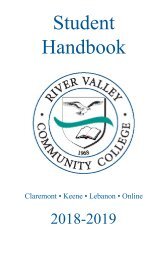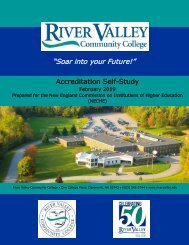Create successful ePaper yourself
Turn your PDF publications into a flip-book with our unique Google optimized e-Paper software.
Full-time Faculty<br />
Location: (http://ibew2320.org/wpcontent/uploads/2017/02/2017-<strong>2019</strong>-CCSNHand-NHHEU-CBA-for-FT-Faculty_Final.pdf)<br />
Intellectual Property Article 32 (pg. 64)<br />
Grievance & Arbitration Article 7 (pg. 14)<br />
Privacy Rights Article 34 (pg. 66)<br />
<strong>RVCC</strong> is committed to the free pursuit and dissemination of knowledge. The Faculty CBA,<br />
Article VI- Academic Integrity and Professional Responsibility (pg. 12) and the Adjunct<br />
Faculty CBA Article 13 (pg. 16), contain outlines of the expectations of both CCSNH and<br />
the faculty which “endorse principles and standards of academic freedom...traditionally<br />
accepted in institutions of higher education. Therefore, as an academic community<br />
committed to teaching and service excellence, CCSNH fosters a professional atmosphere<br />
that promotes the highest standards of professional conduct and integrity.”<br />
Students, likewise are expected to take advantage of various points of view, both from<br />
instructors and classmates and be guided by the <strong>RVCC</strong> Education Philosophy which defines<br />
the educated person as someone who can: “read critically, write clearly and<br />
comprehensively, reason analytically and utilize mathematical and scientific skills to solve<br />
life’s problems.”<br />
<strong>RVCC</strong> and the CCSNH System have established clear policies ensuring institutional integrity<br />
related to grievance policies for faculty, staff, and students. The Student Handbook<br />
outlines the process for a student to appeal a grade (pg. 20). For students who are placed<br />
on Academic Probation, the Academic Standing Committee (ASC) has policies and<br />
procedures that reviews each student’s case individually. Prior to the evaluation, students<br />
are notified of their right to appeal their suspension. Faculty (full-time and adjunct) and<br />
staff grievance policies are outlined in each group’s respective Collective Bargaining<br />
Agreements (Staff CBA: Article 7, pgs. 13-16; Adjunct Faculty CBA: Article 7, pgs. 14-17;<br />
Full-time Faculty CBA: Article 7, pgs. 9-12).<br />
The Student Code of Conduct, contained within the Student Handbook (pages 43-54)<br />
covers areas of the College that ensure students understand the operations of the College<br />
including General Infractions, Academic Misconduct, Disruption of College Operations,<br />
Health & Safety Violations, Violations of Criminal Laws and the College Code of Conduct,<br />
Student Disciplinary Proceedings, the Judicial Process and Student Rights. The Handbook<br />
also covers many important topics related to the Academic Appeal Process, Academic<br />
Integrity, Academic Probation, Cheating & Plagiarism, Dismissal from the College, FERPA,<br />
and the Grading System.<br />
Legal Obligations<br />
<strong>RVCC</strong> observes all legal requirements. It has a charter and formal authority from the<br />
State of New Hampshire authorizing the College to grant all degrees it awards, and has the<br />
authority to conduct these activities in the local jurisdictions it serves. State of New<br />
Hampshire RSA 188-F:1 formally established the Community College System of New<br />
140 | P a g e





